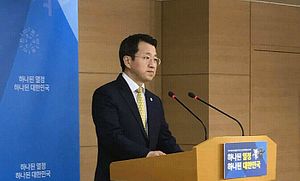As 2018 begins, there have been signs of improving conditions on the Korean peninsula.
On January 4, the Chinese foreign ministry announced that Beijing will send Kong Xuanyou, vice foreign minister and special representative of the Chinese government on the Korean peninsular affairs, to Seoul. This development comes immediately after North Korean Supreme Leader Kim Jong-un reopened the Panmunjom hotline with South Korea on January 3.
At the regular press conference on January 4, China’s foreign ministry spokesperson Geng Shuang said that the special envoy Kong will travel to Seoul from January 5 to 6 to “hold consultation and exchange views on the situation on the Korean Peninsula” with Lee Do-hoon, special representative for Korean peninsula peace and security affairs and chief representative for six-party talks of South Korea.
Kong, 59, is an ethnic Korean from the Heilongjiang province in northeastern China. He has held senior positions at the Chinese embassy in Japan and was China’s ambassador to Vietnam from 2011 to 2014. In August 2017, he was appointed as the special representative on Korean peninsula affairs, replacing Wu Dawei, who retired after more than 13 years overseeing the North Korea issue.
As The Diplomat has been following, since New Years North Korea’s leader has made a few dynamic moves. In his New Year speech, aside his more inflammatory remarks, Kim offered an olive branch to South Korea by expressing his willingness to participate in the upcoming PyeongChang Winter Olympics. Two days later, according to the request of the South’s Unification Ministry, Kim ordered the Committee for the Peaceful Reunification of the Fatherland — the Northern counterpart of the Unification Ministry — to reopen the Panmunjom hotline, which was suspended by the North in February 2016.
Ri Son-gwon, chairman of the North’s Committee for the Peaceful Reunification of the Fatherland, said in a TV statement that Kim decided to reopen the hotline “in order to discuss in a timely manner issues concerning sending a delegation to the PyeongChang 2018 Olympic and Paralympic Winter Games and other related matters.”
Ri noted the “recent positive tendency,” and China repeatedly expressed its strong support for the de-escalatation of tensions between the two Koreas through “dialogue and consultation.”
At the regular press conference on January 3, Geng said that “China is willing to continue to play a positive and constructive role in bringing the issue back to the right track of peaceful settlement.”
The next day, Geng added that “China welcomes the recent concrete efforts made by the DPRK and the ROK.” He further urged the international community to support and encourage these positive developments. The message seemed aimed especially at the United States.
The fact that South Korea decided to have an immediate face-to-face talk with China’s special envoy also demonstrates Seoul’s interest in engaging with Beijing to lessen tensions on the Korean peninsula.

































